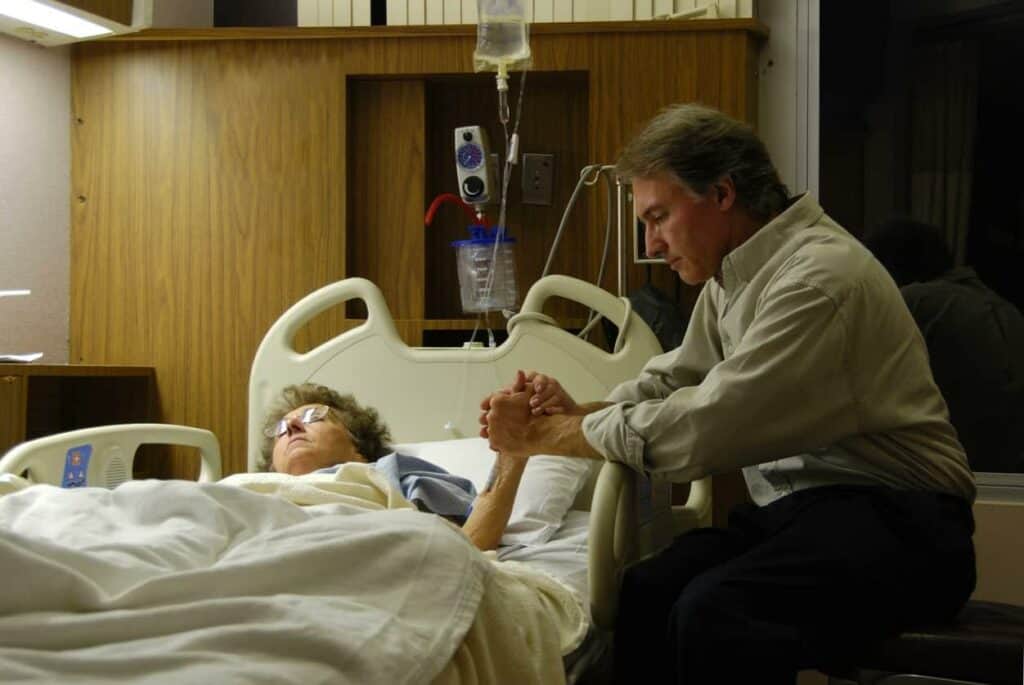
Are you worried sick about your loved one care in their final moments? You don’t have to.
Hospice care can relieve pain and other symptoms, and improve quality of life.
This comfort care helps you and your loved one focus on what is important — creating cherished moments in those final stages.
So, what is hospice care, how do you know if your loved one is eligible, and how do you get and pay for care?
Keep reading to learn everything you need to know about hospice care, and how to get started.
What is Hospice Care?
Some people misunderstand hospice and equate it to imminent death. Hospice is far from that.
Hospice care is medical care for seniors who are terminally ill, and approaching the end of life when cure is no longer an option. It focuses on relieving symptoms, addressing emotional and spiritual needs, and improving the quality of life.
Hospice care also focuses on the family and provides comfort and education at that critical stage of their loved one’s life.
The goal of hospice is to provide is to honor the wishes of the sick loved one and their family members, help the ill loved one live with comfort and dignity, and feel supported as they prepare for death in their way.
By focusing on comfort and reducing suffering, you and your loved one can prioritize spending time together and creating meaningful memories.
It’s important to know that hospice is not:
- A replacement for home care or other residential care
- Focused on treatments to prolong life
- Provided to hasten death
- Offered 24/7 in most cases
Who can benefit?
Older adults who can benefit from hospice have chronic conditions that are no longer treatable.
Instead of exploring treatment and prolonging suffering, comfort, and quality of life are prioritized during the final stages of life.

Some of these chronic conditions include:
- Cancer
- Alzheimer’s disease
- Dementia
- Kidney disease
- Lung disease
- Heart disease
- Parkinson’s disease
- Amyotrophic lateral sclerosis (ALS)
Types of hospice care
There are four levels of hospice care. The appropriate level of care will be determined by your hospice care team in consideration of your preferences.
- Routine home care: This is the common level of hospice care, and is also referred to as in-home hospice care. Family members, friends, or paid caregivers provide care at home. Your loved one receives regular visits from hospice providers.
- Continuous home care: Your loved one receives more intensive short-term care at home to recover from a health crisis.
- General inpatient care (GIP): Your loved one receives care in an external facility such as a hospital, clinic, or hospice care center because their symptoms cannot be managed at home.
- Respite care: This is short-term care in a hospital, nursing home, or respite care center, so you, or other family members responsible for your loved one’s care can take a break.
Most older adults prefer to receive hospice care at home. The reason is to be as close to family as possible and make it easy to spend time together. If this is what your loved one wants, you can talk to their hospice care provider to determine if that would be appropriate for them.
Plus remember, even if your loved one is receiving care in a hospital for the short term, they can transition to home care once their symptoms are stable.
What Does Hospice Care Provide?
Most hospice care providers offer the following hospice services to ill seniors and their families.

Symptom Management
This includes appropriate methods to manage your loved one’s symptoms such as pain relief medications, physical and occupational therapy, and speech therapy.
Your loved one’s hospice provider will determine the appropriate methods to manage their symptoms.
Regular Visits
If your loved one is receiving routine or continuous care at home, the hospice team will visit them regularly to check their vitals, address any other health concerns they may have, and provide emotional and spiritual support.
Medical Equipment
Hospice provides the necessary medical equipment and supplies to your loved one. This can include:
- Hospital bed
- Wheelchair
- Walkers
- Oxygen
- Catheters
- Bandages
Dietary Counseling
Understanding and giving the body what it needs during the final moments can be challenging. Hospice care provides your loved one with dietary counseling so they can consume the best diet for them at that point.
Spiritual Care
Often, as we approach the end of life, we tend to pay more attention to the spiritual dimension of life. We may be curious about questions of the afterlife, purpose, and God.
Depending on your loved one’s belief, they may benefit from spiritual care at this crucial stage of their lives. Your hospice care team will provide your loved one with a chaplain or spiritual head who will make sure they get the support they need.
Whether that is helping them think about what death means, saying goodbye to loved ones, or performing a religious ceremony.
Coordination of Care
Family members may find it challenging to manage the overall care of their loved one. From prescriptions to doctor visits, emergencies, advanced directives, and more, managing care can be a handful.
The hospice care team will manage your loved one’s care completely, and ensure everyone is on the same page. A social worker or hospice nurse will organize family meetings to keep you and your family updated about your loved one’s care. They will tell you how your beloved senior is doing and what to expect.
Periodic meetings and coordination of care can reduce stress levels for family members, and give them much-needed support.
Bereavement/Grief Care
This is the time when you feel sadness in the months or days leading up to the passing of your loved one or after their death. Handling grief isn’t easy, and the hospice care team provides support to family members during this period.

A trained volunteer or grief counselor will be assigned to you and your family. They will provide support through phone, and in-person meetings, or refer you to other support groups.
Bereavement care can be offered up to 13 months after the passing of your loved one.
Who Provides Hospice Care?
Care is provided by a multidisciplinary team of professionals who offer medical, emotional, and spiritual support. They include:
- Hospice Physicians: They oversee the patient’s medical care plan, and coordinate with the primary care physician and specialists. They also adjust your loved one’s care plan as needed to ensure support and quality of life.
- Hospice Nurses: They administer medications and treatments to manage symptoms and pain. They also provide regular assessments and offer guidance on caregiving techniques to family members.
- Hospice Aides: They assist with personal care tasks such as bathing, dressing, and grooming. They provide support with mobility and transferring, as well as offer companionship and emotional support to patients and families.
- Social Workers: They assess the social and emotional needs of patients and families, provide counseling and support to cope with end-of-life issues, and assist with financial, legal, and practical concerns.
- Chaplains or Spiritual Counselors: They offer spiritual guidance and support based on the patient’s beliefs and preferences. They provide pastoral care, prayer, or rituals as requested. They help patients and families explore existential questions and find meaning in their situations.

- Volunteers: They can be friends, other family members, or people not related to you. They Provide companionship and emotional support to patients and families, assist with household chores, errands, or meal preparation, and offer respite care to family caregivers.
- Bereavement Counselors: They offer support and counseling to family members before and after the patient’s death. They facilitate grief support groups and individual counseling sessions and provide resources and referrals for additional support as needed.
- Physical, Occupational, and Speech Therapists (as needed): They assist with maintaining or improving mobility, strength, and function. Provide strategies for managing swallowing difficulties, communication challenges, or other impairments. They also support caregivers in implementing therapy techniques and adaptations at home.
Who makes up the hospice care team depends on the care needs of your loved one.
When Should Hospice Care Start?
Hospice care should begin when your loved one’s condition has worsened and is no longer curable.
Generally, a hospice doctor will certify whether it is time for hospice if your loved one:
- Has a few months or less to live
- Is no longer responding to treatment to cure the condition
- Wishes to stop curable treatment
Hospice must be started early enough, so patients and their families can benefit from all it has to offer. A study found out that 10% of people receive hospice care too late which can result in dissatisfaction and other unmet needs.
Beginning hospice doesn’t mean giving up; it just means that the time has come for comfort and relief from pain to be prioritized over curative treatment.
What happens when I’m in hospice?
Once your loved one is in hospice, the hospice care team will create a personalized care plan to provide the highest level of comfort, manage symptoms, and improve their quality of life.

Depending on where your loved one chooses to receive care — at home or in a hospital setting — the care team will check on them regularly and provide the necessary support.
Each member of the care team will contribute their quota to ensure your loved one leads a quality life despite their condition.
How long can a person live in hospice?
Hospice is typically for persons who have a prognosis of six months or less to live.
However, a person can live longer than 6 months and continue to receive hospice when a doctor recertifies them.
It’s also possible for your loved one’s condition to improve during hospice. If this is the case, they will be discharged, and go back to receiving curative treatment.
How is Hospice Care Different From Palliative Care?
Hospice and palliative care are sometimes used interchangeably, but they have some differences.
Hospice is advised when a patient’s condition becomes incurable, and they have six months left to live. Hospice focuses on providing comfort near the end of life.
Palliative care on the other hand is offered to relieve pain and provide emotional and spiritual support while curative treatment is still being pursued.
Unlike hospice, palliative care can begin at any point of the serious illness.
| Hospice Care | Palliative Care | |
|---|---|---|
| Purpose | Focuses on end-of-life care for terminally ill patients | Focus on improving the quality of life for patients with serious illness |
| Eligibility | For patients with a prognosis of six months or less to live | Can be provided at any point of the illness |
| Focus of treatment | Emphasizes comfort and symptom management | Emphasizes symptom management while exploring treatment options |
| Funding source | Covered by Medicare, Medicaid, or private insurance. | Coverage can include Medicare, Medicaid, or private insurance. |
| Length of care | 6 months or more, as long as you meet hospice criteria of life expectancy | This depends on the patient’s care needs, and what their insurance can cover. |
How Do I Pay For Hospice?
Medicare is the go-to funding source when it comes to paying for hospice. Medicare covers all of hospice care and services. There are usually no deductibles, although, there may be small co-payments for prescriptions and respite care.

Am I eligible for Medicare-covered hospice?
To be eligible to receive hospice benefits from Medicare, your loved one must meet the following criteria:
- A medical doctor or hospice doctor must certify that they have 6 months or less to live
- Your loved one must accept to receive hospice care and forgo curative treatment
- Your loved one must sign a statement indicating they wish to receive hospice benefits from Medicare instead of other covered treatment options for their condition.
Once they meet these criteria, you can start your search for hospice providers that accept Medicare.
What aspect of hospice does Medicare cover?
According to the Centers for Medicare and Medicaid Services, Medicare covers the following:
- Original Medicare Part A covers the cost of hospice
- Medicare Part D may cover the cost of medications not covered by Part A
- Medicare Advantage or Part C may cover the cost of additional medications or treatment not covered by Part A
- Medigap may cover additional costs or deductibles. However, it doesn’t cover long-term costs.
You can find out more about Medicare coverage for hospice by talking to a representative. You can call 1-800-633-4227 or start a live chat with a real person.
Other ways to pay for hospice
In most states, Medicaid may have similar coverage for hospice care. If your loved one has Medicaid insurance, you can reach out to an official in their state to learn more about the extent of coverage.
If you’re a veteran, the Veterans Health Administration provides hospice services and contracts with local hospice providers. If your loved one has the VHA Standard Medical Package, they are eligible and don’t have to co-pay.
Private health insurance plans such as plans obtained from an employer, or long-term care insurance may offer hospice benefits with limited coverage. Find out the extent of coverage if your loved one has one.
Additionally, some hospice providers accept private or out-of-pocket payments for uninsured individuals.
How to Find Hospice Care Near Me
There are a couple of ways to find hospice providers near your loved one. Let’s look at some of them.
Talk to your doctor

Talk to your loved one’s doctor about hospice, and if they can recommend providers in your area. Often doctors have providers whom they have worked with, and whom they trust. This will reduce the amount of work and vetting you need to do to find the right provider.
Hospice care directories
You can utilize online directories specifically dedicated to hospice care. For instance, websites like the National Hospice and Palliative Care Organization (NHPCO) often list hospice providers along with their contact information and services offered.
Care Compare tool
This is a free tool offered by the Centers for Medicare and Medicaid Services. On the Care Compare website, you can find Medicare-approved hospice providers as well as nursing home, and palliative care providers.
To start your search, put in your Zip code and hit “search”. This will bring up hospice providers near you. You can compare providers, look at their services, and review their ratings to determine if they are ideal for your loved one.
Online search
Use search engines like Google or Bing and type in “hospice care near me” or “hospice care [your location].” This should provide you with a list of hospice care providers in your area. Be sure to evaluate their services, and look at their reviews before moving forward.
Insurance providers
If your loved one has private insurance, contact the insurance company to inquire about hospice care providers within your network. They can provide you with a list of covered providers or guide you on how to find one.
Local hospitals or clinics
Reach out to hospitals, clinics, or other healthcare facilities in your area. They may have information about hospice programs or be able to refer you to local providers.
Once you have a couple of providers you are considering, the next step is to evaluate their services and other factors.
Factors to Consider When Choosing a Hospice Care Provider
Choosing a hospice care provider is a critical decision as this will affect the quality of care for your loved one and family.
Here are some key factors to consider:
- Accreditation and Licensing: Ensure that the hospice provider is accredited by relevant organizations and is licensed to operate in the state your loved one resides. Accreditation from bodies like The Community Health Accreditation Partner (CHAP) or the Centers for Medicare and Medicaid Services (CMS) can show that it adheres to high-quality standards.
- Services Offered: Assess the range of services offered by the hospice, and whether they can meet your loved one’s needs. This includes medical care, nursing services, pain management, emotional and spiritual support, bereavement counseling, and any additional services tailored to your specific needs.
- Staff Expertise and Experience: Ask about the qualifications and experience of the hospice team, including physicians, nurses, social workers, chaplains, and volunteers. A skilled and compassionate team can make a huge difference in the quality of care you and your loved one receive.
- Availability and Responsiveness: Consider the availability of the hospice staff and their responsiveness to your inquiries and needs. Ideally, the hospice team is supposed to pay regular visits to your loved one if they are receiving care at home. They should also be able to provide you with accurate answers to your questions.
- Location and Setting: Where would your loved one be receiving care? Assess the location and setting where hospice care will be provided. Determine whether care will be offered at home, in a hospice facility, or a nursing home, and consider factors such as proximity to family members, accessibility, and the environment’s suitability for comfort and peace.

- Quality of Care Ratings: Research the hospice provider’s quality of care ratings and performance indicators. Websites like Medicare’s Hospice Compare or state health department reports may provide valuable insights into the provider’s track record in delivering high-quality care. Additionally, check for reviews and testimonials from others who have used the hospice provider. This can be found on their website or review sites such as Yelp or Google My Business.
- Cost and Insurance Coverage: Clarify the costs associated with hospice care and ask about insurance coverage, including Medicare, Medicaid, private insurance, or other financial assistance programs. Ensure that you understand any out-of-pocket expenses and financial obligations so there are no future surprises.
- Personal Preferences and Comfort Level: It’s important to trust your gut and consider the personal preferences and comfort level of yourself and your loved one. Choose a provider with whom you feel comfortable, respected, and confident in their ability to meet your loved one’s needs and provide compassionate care during this sensitive time.
Wrapping Up
Hospice care doesn’t mean giving up, it means it’s time to focus on comfort and quality of life over suffering and curative treatment.
The hospice team will offer support in various areas including symptom management, care coordination, respite care, bereavement care, and more.
You and your loved one can focus on creating meaningful moments that you’ll cherish even when they are no more.
But, choosing the right provider who meets your needs on every level is crucial to ensure that you and your loved one are satisfied with hospice care.
At Amy’s Eden Senior Care, our end-of-life services help you cherish the moments and cherish the day. We create an environment where comfort meets compassion, so your loved one leads their best life even in their final moments.
Let us show you how we can make every day of your loved one count. Contact us today to learn more about our hospice services and how we provide compassionate care.




